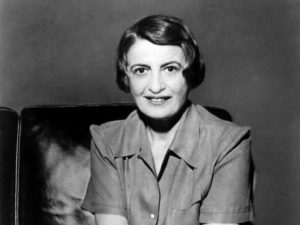Ayn Rand (1906 – 1982) was a Russian-American novelist, philosopher, playwright and screenwriter. She is famous for two best-selling novels among her multiple novels: The Fountainhead and Atlas Shrugged, and for developing a philosophical system which she called Objectivism
Her novel Atlas Shrugged was published in 1957 includes elements of science, fiction, mystery and romance which contain Ayn Rand’s most far-reaching statement of Objectivism. The book depicts a dystopian (everything degraded) United States in which private businesses suffer under increasingly oppressive laws and regulations. Ayn Rand astonishingly defends business and capitalism. She does not regard capitalism as an amoral. Rand held that money, as such, is a good thing for society, because it enables us to trade with one-another peacefully, by mutual consent to mutual benefit. In this sense, everyone ought to value and appreciate money.
good thing for society, because it enables us to trade with one-another peacefully, by mutual consent to mutual benefit. In this sense, everyone ought to value and appreciate money.
The hero of her most popular novel, “Atlas Shrugged,” John Galt is a ruthless head of industry who struggles against domineering government regulations that stand in the way of commerce and profit. In a revolt, he and other captains of industry each close down production of their factories, bringing the world economy to its knees. “You need us more than we need you” is their message.
Nevertheless, she didn’t mean that one needs to have great desire for money. She didn’t mean that everyone should seek to grow rich by valuing income over all else. She went on to say that it’s important to love your work than to do the work that pays the most.
The Fountainhead is a 1943 novel, her first major literary success. The novel’s protagonist, Howard Roark, is an individualistic young architect who designs modernist buildings and refuses to compromise with an architectural establishment unwilling to accept innovation. Roark exemplifies what Rand believed to be the ideal man, and his struggle reflects Rand’s belief that individualism is superior to collectivism. She propagated in this book the role of art in human life is to transform humans’ metaphysical (nature of mind) ideas by selective imitation of reality into a physical form. Each artist’s work of art is known by his ideas and to which one can respond emotionally or apathetically.
In both novels, Atlas Shrugged and Fountainhead Rand talks about Objectivism which is a philosophical system that is not subject to change. Objectivism’s central beliefs are that reality exists independently of consciousness, that human beings have direct contact with reality through their own sense and perception; a person attains objective knowledge from perception through the process of forming his/her own concepts and own logic. The essentials of objectivism are: reality, reason, self-interest, and capitalism. And, capitalism is the only political system that leaves the dissatisfied free to organize their own communities and associations, and to build their own subculture
Rand emphasizes that individual rights are regarded in only social system consistent with morality which follows laissez-faire capitalism. Rand’s theories regarding reason link with the intellect. She believed that intelligence is the ability to deal with a broad range of ideas. Objectivism requires people to “activate” their minds, understand all the facts of the current situation, and perform the required. The modern economic theory is based on exactly these principles. A rational agent is defined as an individual who is self-interested. A market is a collection of such rational agents, each of whom is also self-interested. Fairness does not enter into it. Cannibalization is regarded as cleverness in business.
Many of Rand’s rich and famous readers have identified at some point in their lives as followers of Rand’s philosophy of objectivism. They feel that her philosophy of supreme self-reliance is based on the pursuit of supreme self-interest; this appears to be romanticized version of American ideals. Americans want freedom from autocracy, hard work and individualism.
In 2008, Sears CEO Eddie Lampert decided to restructure the company according to Ayn Rand’s principles. Lampert broke the company into more than 30 individual units, each with its own management and each measured separately for profit and loss. The idea was to promote competition among the units, which Lampert assumed would lead to higher profits. What happened is that the divisions turned against each other. Sears and Kmart, the two big umbrella brands suffered. Interviews with more than 40 former executives, many of whom sat at the highest levels of the company, painted a picture of a business that’s devastated by infighting in its divisions battling over fewer resources. Cooperation and collaboration got completely lost in the warring among strategic business units (SBU).
No divisions were willing to lose revenues, to help other unit product to push, which would drive traffic into the store, thereby helping all divisions. For example: the appliance division found it could make more profit from selling Samsung appliances than from selling Sears’ Kenmore brand, so they gave more and better floor space to Samsung. The mother brand was reduced to ground level.
On a serious note, some economists who have conducted some experimental study on objectivism, feel good that majority in the society do not follow the doctrine of objectivism. We are far more cooperative and willing to trust, and we retaliate strongly when others behave uncaringly. In fact, we are willing to pay a penalty for an opportunity to punish people who appear to be breaking implicit rules of fairness in economic transactions. How many of you look upon Ayn Rand’s philosophy of objectivism?














































